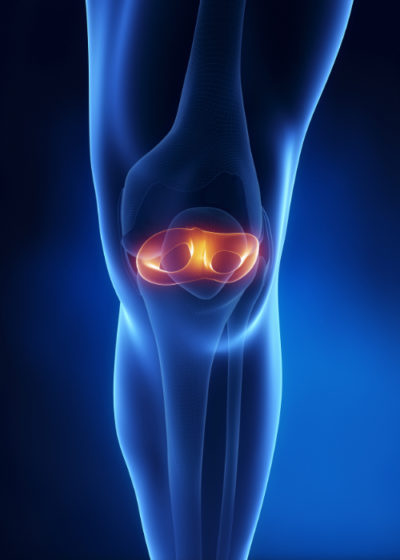Meniscus Deficiency Specialist

Are you experiencing knee pain, swelling or a sensation that the knee is “stuck” in position? If so, you may have a a meniscus deficiency. Patients who have meniscus loss experience similar symptoms. Meniscus deficiency specialist, Dr. Matthew Provencher provides diagnosis and both surgical and nonsurgical treatment options for patients in Vail who are experiencing symptoms of meniscus deficiency. Contact Dr. Provencher’s team today!
What is Meniscus Deficiency?
When individuals discuss an articular cartilage injury in the knee, many of them are referring to a torn meniscus. The meniscus is a “c” shaped cushion of cartilage found in the knee responsible for acting like a “shock absorber” between the thighbone (femur) and shinbone (tibia). The meniscus is very tough and rubbery to help stabilize the joint, much different than articular cartilage that is slippery and smooth. If an injury to the meniscus occurs, such as a torn meniscus, patients will experience chronic pain and swelling, typically leading to arthritis of the joint if left untreated. Dr. Matthew Provencher, Vail, Aspen, Colorado Springs and Denver, Colorado area orthopedic knee specialist, treats patients who have experienced a damaged meniscus and loss of cartilage.
The medial meniscus, located on the inside of the knee, absorbs approximately 50% of stress placed on the knee joint during activities. The lateral meniscus, located on the outside of the knee, absorbs approximately 70% of stress placed on the knee’s lateral compartment during activities. Both structures work together to help provide knee stability and to help prolong health of the joint. If a patient experiences a severe torn meniscus or other articular cartilage injury, the meniscus may break away or wear down over time, leading to painful knee arthritis in many cases. The outer one-third of the meniscus, known as the “red zone”, has a rich blood supply, which may heal on its own if the tear is small. However, the inner two-thirds of the meniscus, known as the “white zone”, has a lack of blood supply, and is incapable of healing on its own.

What are the Symptoms of Meniscus Deficiency?
A torn meniscus causes patients to experience knee pain, swelling, a sensation that the knee is “stuck” in position and difficulty bending and straightening the leg. Patients may also experience a “popping” sensation at the time of injury. Patients who experience meniscus loss also experience similar symptoms.
How to Know if you Have Meniscus Deficiency:
A proper physical examination must be performed by Dr. Provencher in order to diagnose a torn meniscus or other articular cartilage injury. Dr. Provencher commonly uses an MRI scan to determine tear pattern and to determine how much cartilage is remaining within the joint. He may also perform a series of x-rays to confirm there is no additional damage to the bony structures.
What are the Treat Options for Meniscus Deficiency?
Treatment options for a torn meniscus or lack of cartilage depends on injury severity, severity of symptoms, patient’s age and patient’s activity level.
Does Meniscus Deficiency Require Surgery?
In cases of an acute tear or acute articular cartilage injury, Dr. Provencher typically recommends non-surgical treatment, such as rest, ice, modified activities and a physical therapy program. He may also perform a cortisone injection in certain patients to help decrease swelling and pain.
What is Meniscus Deficiency Surgery?
Dr. Provencher commonly recommends a surgical procedure in severe cases of a torn meniscus or cases of meniscus loss. The specific procedure will be determined by Dr. Provencher based on size of tear, location of tear, amount of remaining cartilage and other associated knee injuries. The meniscus can be repaired (stitched) or can be debrided (torn portion is removed). A stitch technique is often reserved for patients with a mild tear that does not require a portion to be removed .A debridement technique is often reserved for patients with a degenerative, complex or non-repairable torn meniscus. If a patient has a very serious meniscus injury and/or has undergone a prior meniscus injury treatment, Dr. Provencher may recommend a meniscal transplant surgery.
For more resources on a torn meniscus or other articular cartilage injury, please contact the orthopedic office of Dr. Matthew Provencher, knee specialist located in the Vail, Aspen, Colorado Springs and Denver, Colorado area.